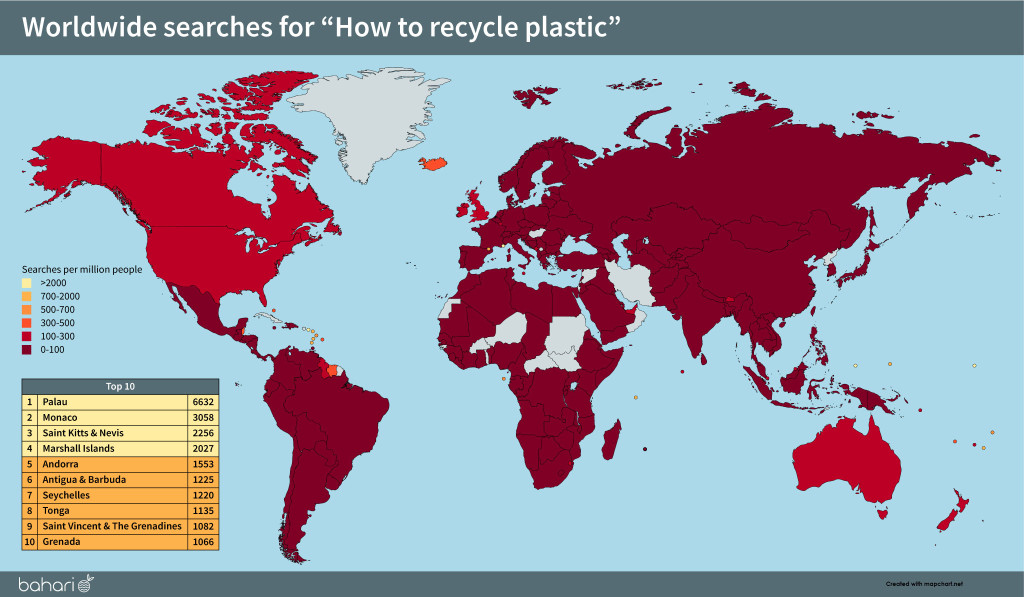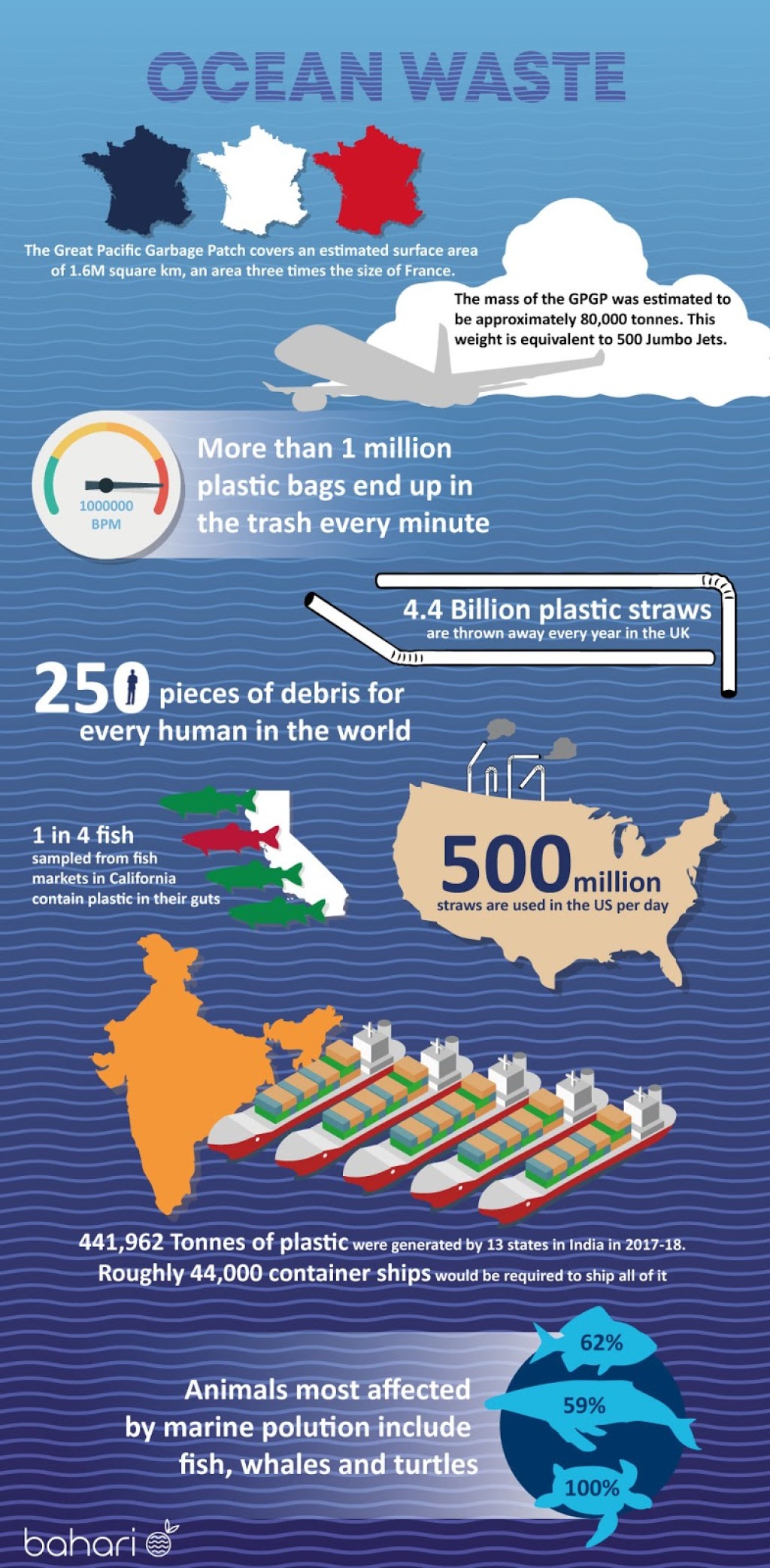In this article, we share all of the most up-to-date single use plastic statistics in the UK and around the world. We discover which countries have plastic bans, how much plastic waste ends up in the ocean and which countries are the most determined when it comes to plastic recycling.
How much plastic ends up in our oceans?
We’ve all heard about the dangers and risks associated with plastic waste and our environment. But how much plastic is really in the world’s oceans?
- The Great Pacific Garbage Patch covers an estimated surface area of 1.6 million square kilometers, that’s approximately 3 times the size of France, with its mass being equivalent to that of 500 jumbo jets.
- More than 1 million plastic bags are used every minute worldwide.
- 4.4 billion plastic straws are estimated to be thrown away every year in the UK, with a further 500 million being used in the US every single day.
- Man-made debris was found in 1 in 4 fish sampled from fish markets in California, Makassar and Indonesia.
- A recent study found that marine plastic pollution affects 100% of turtles, 59% of whales and 62% of fish stocks.
Which countries have plastic bans?
One great step in the right direction is for governments all over the world to put new laws in place to discourage the use of single use plastics. The following countries have put a range of bans in place to help tackle plastic pollution.
- Back in 2016, Hamburg brought in a plastic ban against non-recyclable coffee pods in order to reduce the amount of plastic going into landfills each year.
- France has also announced that from this year (2020), there’ll be a total ban on plastic cups, plates, and cutlery, following on from the country’s plastic bag ban in 2015.
- In 2017, Zimbabwe’s environment management agency instructed all companies in the food industry to stop using polystyrene containers and instead opt for more environmentally friendly alternatives. Those who don’t comply with the ban will be ordered to pay a fine of up to $500.
- Vanuatu was the first country in the world to legally ban the use of plastic straws, with the country encouraging use of more eco friendly alternatives instead.
- Morocco has cracked down on the use of plastic, having passed a bill preventing any plastic bags from being used in the country.
- The UK has banned plastic microbeads, which the environment secretary Michael Gove describes as being “unnecessary and lethal to sea creatures''. Instead, the government has begun funding research into micro plastic alternatives which will be much more sustainable. In 2015, the UK also introduced a 5p plastic bag charge, which resulted in 9 billion fewer plastic bags in circulation. On the 1st October 2020 the government began to implement it's new ban on plastic straws, stirrers and cotton buds in an effort to protect the environment.
- Taiwan has introduced a blanket ban on all single-use plastics, including straws, cups, utensils and bags, with a view to eliminating all single use plastics by 2030.
- Montreal has banned single use plastic bags, with the whole of Canada also placing a ban on microbeads after it was revealed that 1.1 million microbeads per square kilometre in Lake Ontario
- Seattle and Malibu have each banned a range of single use plastics, with fines in place for those who don’t comply.
- India’s famous capital, New Delhi, has taken a step in the right direction with their recent ban on all forms of single use plastic.
- Various Australian states have also placed bans on single use plastic bags in order to reduce damage to the environment.
- Rwanda has also imposed a ban on all plastic bags. Using one here could land you with a fine or even a jail sentence.
- If you use, produce or sell plastic bags in Kenya you’ll face up to four years in prison or a large fine ($38,000). This has been described as one of the world's harshest plastic bans.
Which are the most (and least) determined countries in the battle against plastic waste?
To find out which country is most interested in plastic recycling, we analysed online search data using the tool Keyword Finder. This allowed us to discover the search habits of people across the globe in relation to the term ‘How to recycle plastic’.
The study revealed that people who live in the small island country of Palau, Oceana, conduct more searches for the term ‘How to recycle plastic’ than any other country in the world. To be precise, over the last 12 months, an average of 6,632 searches were made for this term per million people in Palau.

Other countries that searched for this term the most included Monaco, Saint Kitts & Nevis and the Marshall Islands. These were closely followed by countries such as Andorra, Antigua & Barbuda, Seychelles and more.
As you can see from the map, one thing all of these countries have in common is their size and geographical position. All of these countries are surrounded by water and have very small populations. Countries such as Palau and Monaco are well known for their beautiful beaches and crystal blue waters, which may explain why so many people search for recycling guidance in those countries.
The countries who were found to be making the fewest searches for the term ‘How to recycle plastic’ were China*, Brazil, Russia, Ethiopia, Turkey and Japan.
*It’s important to bear in mind that search volume data from China can be somewhat unreliable due to restrictions and censorship limitations in place in the country.
Limitations
The presentation of this research is based on the assumption that higher search volumes equate to more interest in plastic recycling. It could be the case that these countries don’t have clear plastic recycling guidance in place which may explain the high search volumes. These figures are also based on the assumption that each search is conducted by a different individual, whereas of course, one person may have conducted multiple searches for the same search term.
We hope these single use plastic statistics have been useful in giving you an overview of the world’s plastic waste habits of 2020. If you’d like to try and use more eco-friendly plastic alternatives in your day to day life, have a browse through our collection of sustainable straws and beeswax wraps for the home.



